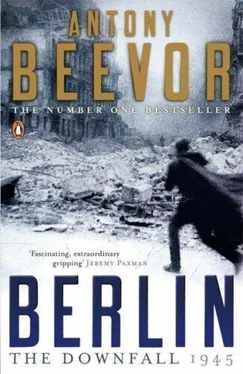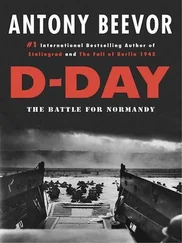The entry of Soviet forces into German territory meant that Stalin’s plans to force Germans to work for the Soviet Union could be put into action. On 6 February an order was issued to ‘mobilize all Germans fit for work from seventeen to fifty years of age and to form labour battalions of 1,000 to 1,200 men each and send them to Belorussia and the Ukraine to repair war damage’. The Germans mobilized were told to report to assembly points wearing warm clothes and good boots. They were also to bring bedding, reserves of underwear and two weeks’ food supply.
With Volkssturm members sent to prisoner-of-war camps, the NKVD managed to conscript only 68,680 German forced labourers by 9 March, the vast majority in the rear of Zhukov and Konev’s armies. A large proportion were women. At first, many of the so-called labour battalions were used locally for rubble clearance and assisting the Red Army. The attitude of Soviet soldiers towards the conscripted civilians was one of intense schadenfreude. Agranenko watched a Red Army corporal form up a working party of German men and women in four lines. He barked out the word of command in pidgin-German, ‘To Siberia, fuck you!’
By 10 April, the proportion sent back to the Soviet Union for forced labour increased rapidly, with 59,536 sent to western parts, mostly the Ukraine. Although still fewer than Stalin had planned, they suffered at least as much as their Soviet counterparts rounded up earlier by the Wehrmacht. It was naturally worst for the women. Many were forced to leave children behind with relatives or friends. In some cases they had even been forced to abandon them altogether. Their life ahead was not simply one of subjection to hard labour, but also to casual rape by guards, with venereal infections as a by-product. Another 20,000 men were put to ‘demontage work’, stripping the factories of Silesia.
Stalin may have described the NKVD rifle regiments to General Bull as ‘a gendarmerie’, but it is still striking how little they intervened to stop looting, rape and the random murder of civilians. There appears to be only one example of intervention in their reports. In April, a group from the NKVD 217th Frontier Guards Regiment arrested five soldiers who broke into a ‘hostel of repatriated Polish women’.
Quite how little the NKVD troops were doing to protect civilians from violence of every sort is indirectly revealed in their own chiefs’ reports to Beria. On 8 March, Serov, the NKVD representative with the 1st Belorussian Front, reported on the continuing wave of suicides. On 12 March, two months after Chernyakhovsky’s offensive began, the NKVD chief in northern East Prussia reported to Beria that ‘suicides of Germans, particularly women, are becoming more and more widespread’. For those who did not have a pistol or poison, most of the suicides consisted of people hanging themselves in attics with the rope tied to the rafters. A number of women, unable to bring themselves to hang a child, cut their children’s wrists first and then their own.
NKVD rifle regiments did not punish their own soldiers for rape, they punished them only if they caught venereal disease from victims, who had usually caught it from a previous rapist. Rape itself, in a typically Stalinist euphemism, was referred to as an ‘immoral event’. It is interesting that Russian historians today still produce evasive circumlocutions. ‘Negative phenomena in the army of liberation,’ writes one on the subject of mass rape, ‘caused significant damage to the prestige of the Soviet Union and the armed forces and could have a negative influence in the future relations with the countries through which our troops were passing.’
This sentence also indirectly acknowledges that there were many cases of rape in Poland. But far more shocking from a Russian point of view is the fact that Red Army officers and soldiers also raped Ukrainian, Russian and Belorussian women and girls released from slave labour in Germany. Many of the girls were as young as sixteen when taken to the Reich; some were just fourteen. The widespread raping of women taken forcibly from the Soviet Union completely undermines any attempts at justifying Red Army behaviour on the grounds of revenge for German brutality in the Soviet Union. The evidence for this is certainly not restricted just to the unpublished notebooks of Vasily Grossman. A very detailed report goes much further.
On 29 March, the Central Committee of the Komsomol (Communist Youth) informed Stalin’s associate Malenkov of a report from the 1st Ukrainian Front. ‘This memorandum is about young people taken to Germany and liberated by the troops of the Red Army. Tsygankov [the deputy chief of the political department of the 1st Ukrainian Front] relates numerous extraordinary facts which affect the great happiness of Soviet citizens released from German slavery. Young people express their gratitude to Comrade Stalin and the Red Army for their salvation.’
‘On the night of 24 February,’ Tsygankov reported in the first of many examples, ‘a group of thirty-five provisional lieutenants on a course and their battalion commander entered the women’s dormitory in the village of Grutenberg, ten kilometres east of Els, and raped them.’ Three days later, ‘an unknown senior lieutenant of tank troops went by horse to where girls were gathering grain. He left his horse and spoke to a girl from the Dnepropetrovsk region called Gritsenko, Anna. “Where are you from?” he asked. She answered this senior lieutenant. He ordered her to come closer. She refused. So he took his gun and shot her, but she did not die. Many similar incidents took place.’
‘In the town of Bunslau, there are over 100 women and girls in the headquarters. They live in a separate building not far from the kommandantur, but there is no security there and because of this, there are many offences and even rape of women who live in this dormitory by different soldiers who enter the dormitory at night and terrorize the women. On 5 March late at night, sixty officers and soldiers entered, mainly from the 3rd Guards Tank Army. Most of them were drunk, and they attacked and offended against women and girls. Even though they were ordered by the commandant to leave the dormitory, the group of tankists threatened him with their guns and caused a scuffle… This is not the only incident. It happens every night and because of this, those who stay in Bunslau are frightened and demoralized and there is much dissatisfaction among them. One of them, Maria Shapoval, said, “I waited for the Red Army for days and nights. I waited for my liberation, and now our soldiers treat us worse than the Germans did. I am not happy to be alive.” ’ ‘It was very hard to stay with Germans,’ Klavdia Malaschenko said, ‘but now it is very unhappy. This is not liberation. They treat us terribly. They do terrible things to us.’
‘There are many cases of offences against them,’ Tsygankov continued. ‘On the night of 14–15 February in one of the villages where the cattle are herded a shtraf company under the command of a senior lieutenant surrounded the village and shot the Red Army soldiers who were on guard there. They went to the women’s dormitory and started their organized mass rape of the women, who had just been liberated by the Red Army.’
‘There are also many offences by officers against women. Three officers on 26 February entered the dormitory in the bread depot, and when Major Soloviev (the commandant) tried to stop them, one of them, a major, said, “I’ve just come from the front and I need a woman.” After that he debauched himself in the dormitory.’
‘Lantsova, Vera, born 1926, was raped twice — first when the vanguard troops came through the territory, and second on 14 February by a soldier. From 15–22 February Lieutenant Isaev A. A. made her sleep with him by beating her and frightening her with threats that he would shoot her. A number of officers, sergeants and soldiers tell the liberated women, “There is an order not to allow you back to the Soviet Union, and if they do allow some of you back, you will live in the north” [i.e. in Gulag camps]. Because of such attitudes to the women and girls, many women think that in the Red Army and in their country, they are not treated as Soviet citizens and that anything can be done to them — killed, raped, beaten and that they will not be allowed home.’
Читать дальше











